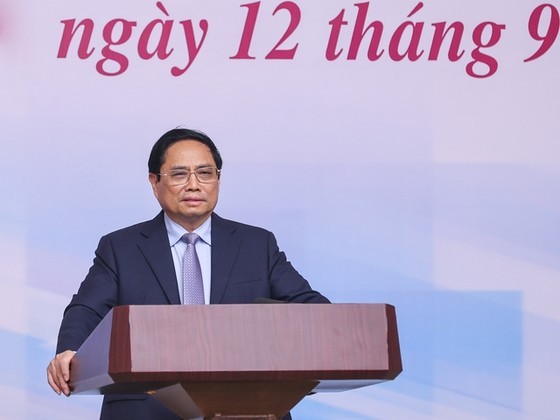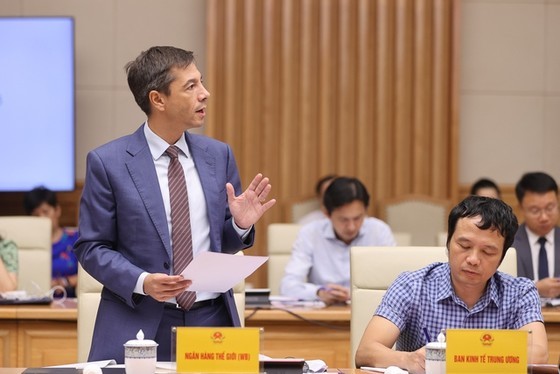 PM Chinh at the conference
PM Chinh at the conference
This figure was released at a conference on maintaining macroeconomic stability, controlling inflation, promoting growth and ensuring major balances of the economy this afternoon chaired by Prime Minister Pham Minh Chinh and Deputy Prime Minister Le Minh Khai.
Reporting about the country’s economic situation at the end of 2022 and early 2023, Minister of Planning and Investment Nguyen Chi Dung said that in the country’s economy will continue to recover, but economic growth is likely to be more difficult in the fourth quarter and 2023. Many international organizations tended to raise the growth forecast in 2022, and lower the growth forecast in 2023 of Vietnam. Production and business activities continued to prosper, public investment capital from the socio-economic recovery and development program while disbursement for three national target programs were accelerated.
However, risks and challenges to economic growth and macroeconomic stability are huge.
Vietnam aims to achieve economic growth of over 7.5 percent in 2022 while; maintaining macroeconomic stability, controlling inflation to below 4 percent in 2022, ensuring major balances of the economy, promoting growth to strive for the realization of the 5-year growth target of 6.5 percent -7 percent a year without weakening growth driving forces in addition to seeking new growth drivers such as digital economy, green economy, digital transformation.
Moreover, the country will develop import and export, towards a harmonious and sustainable trade balance. Disbursement of annual state budget investment will reach 95 percent-100 percent of the plan assigned by the Prime Minister taken from local state budget capital. Moreover, localities will accelerate the implementation of key national infrastructure projects, concretize strategic breakthroughs in infrastructure.
 Andrea Coppola, Lead Country Economist and Program Leader for Equitable Growth, Finance and Institutions in Vietnam
Andrea Coppola, Lead Country Economist and Program Leader for Equitable Growth, Finance and Institutions in Vietnam
Speaking at the conference, Prime Minister Pham Minh Chinh said that the Ministry of Planning and Investment is currently developing a Government resolution on maintaining macroeconomic stability, controlling inflation, promoting growth, and ensuring economic conditions. major balance of the economy in the current context.
The Prime Minister said that, in the context of difficulties, responsible agencies should seek stability in the uncertainty while establishing risk management tools in recession and crisis is an indispensable attribute in the market economy and establish a front line of international economic cooperation and competition in integration.
Although representatives from international organizations supposed that Vietnam’s economic growth is positive, the Prime Minister said that the situation is still very difficult, more challenges than opportunities and advantages. Vietnam's economy is modest in size, wide open, and has limited resilience, so a small external impact can also affect the country. Disbursement of public investment capital is still slow. Implementation of some solutions and policies is still slow. The potentially risky bond, securities and real estate markets have recently held many conferences on these markets to regulate appropriately and not unreasonably tighten.
The Prime Minister said that in the current context, the management must adhere to reality, on the basis of economic and technical issues, and must be politically and socially stable, with the art of flexible management suitable, efficient.
Andrea Coppola, Lead Country Economist and Program Leader for Equitable Growth, Finance and Institutions in Vietnam, recommended that Vietnam should have a reasonable fiscal policy to be able to handle public investments and these public investments must promote in a more efficient manner. In the short term, it is necessary to make good and effective use of packages to support growth and recovery; thereby, limiting the negative impact of price increases.
According to him, if Vietnam can control inflation, the efficiency and potential of the economy is still below potential. If inflation is brought up to 4 percent compared to the expected level, the interest rate must be tightened and the State Bank of Vietnam must do this. It is necessary to firmly ensure the resilience of the national finance and it is necessary to deal with bad debts and overdue debts of the economy so that all banks have to comply with the handling of bad debts.
Mr. Francois Painchaud, Regional Resident Representative for Vietnam at International Monetary Fund (IMF) assessed that Vietnam is recovering very well. In July, the IMF raised its growth forecast for Vietnam. This is the only country in Asia and the ASEAN region where the IMF forecasts growth; however, the IMF reduced its forecast to 6.7 percent in 2023 due to the high growth rate of 2022, but still very high compared to other regions and compared to other countries, especially countries in Asia.
Mr. Francois Phainchaud recommended that Vietnamese government should adopt monetary policies cautiously while maintaining tight monetary policy and acting consistently. The State Bank is trying to stabilize the exchange rate to help domestic production to be consistent with monetary policy.
























